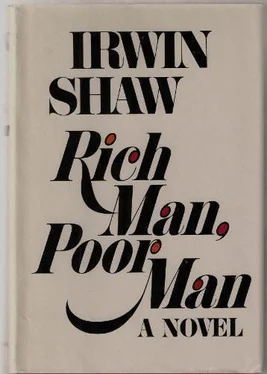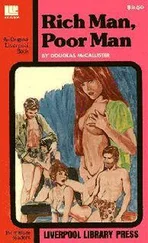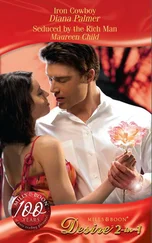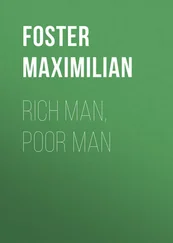As he watched, he saw the fire spread. There must have been a building right near the cross, down wind from it. It must have been good and dry, because in no time at all the whole sky was lit up.
In a little while, he heard the bells of the fire engines racing through the streets of the town and up the hill.
Not a bad night, Jordache thought, all things considered.
He took a last drink and then started to row leisurely towards the river bank.
Rudolph stood on the steps of the high school and waited for the boys at the cannon to shoot it off. There were hundreds of boys and girls milling around on the lawn, shouting, singing, kissing. Except for the kissing, it was very much like the Saturday nights after the team had won a big football game.
The cannon went off. A huge cheer went up.
Then Rudolph put his trumpet to his lips and began to play America’. First the crowd fell silent and the slow music rang out all alone, note by solemn note over their heads. Then they began to sing and in a moment all the voices joined in: ‘America, America, God shed His grace on thee, And crown thy good with brotherhood, From sea to shining sea.
There was a big cheer after the song was over and he began to play the ‘Stars and Stripes Forever’. He couldn’t stand still
while playing the ‘Stars and Stripes Forever’, so he began to march around the lawn. People fell in behind him and soon he was leading a parade of boys and girls, first around the lawn and then into the street, marching to the rhythm of his horn. The boys serving the cannon trundled it along at the head of the procession just behind him and at every intersection they stopped and fired it and the boys and girls cheered and grownups along the route applauded and waved flags at them.
Striding at the head of his army, Rudolph played ‘When the Caissons Go Rolling Along,’ and ‘Columbia the Gem of the Ocean’, and the highschool hymn, and ‘Onward Christian Soldiers’, as the parade wound its jubilant way through the streets of the town. He led them down towards Vanderhoff Street and stopped in front of the bakery and played, ‘When Irish Eyes Are Smiling’, for his mother’s sake. His mother opened the window upstairs and waved to him and he could see her dabbing at her eyes with a handkerchief. He ordered the boys at the cannon to give a salute to his mother and they fired the piece and the hundreds of boys and girls roared and his mother wept openly. He wished his mother had combed her hair before opening the window and it was too bad she never took the cigarette out of her mouth. There was no light from the cellar tonight, so he knew his father wasn’t there. He wouldn’t have known what to play for him. It would have been hard to choose the proper selection for a veteran of the German army on this particular night.
He would have liked to go out to the hospital and serenade his sister and her soldiers, but the hospital was too far away. With a last flourish for his mother, he led the parade towards the centre of town, playing ‘Boola-Boola’. Perhaps he would go to Yale when he finished school next year. Nothing was impossible tonight.
He didn’t really decide to do it, but he found himself on the street on which Miss Lenaut lived. He had stood outside the house often enough, hidden in the shadow of a tree across the street, looking up at the lighted window on the second floor which he knew was hers. The light was on now.
He stopped boldly in the middle of the street in front of the house, looking at the window. The narrow street with its modest two-family dwellings and tiny lawns was packed with his followers. He felt sorry for Miss Lenaut, alone, so far from home, thinking of her friends and relatives joyously flooding the streets of Paris at this moment. He wanted to make amends to the poor woman, show that he forgave her, demonstrate that there were depths to him she had never guessed, that he was more than a dirty little boy with a foul-mouthed German father, who specialised in pornographic drawings. He put the trumpet to his lips and began to play the Marseillaise. The complicated, triumphant music, with its memories of flags and battles, of desperation and heroism, rang in the shabby little street, and the boys and girls chanted along with it, without words, because they didn’t know the words. By God, Rudolph thought, no highschool teacher in Port Philip ever had anything like this happen to her before. He played it through straight once, but Miss Lenaut didn’t appear at the window. A girl with a blonde pigtail down her back came out of the house next door and stood near Rudolph, watching him play. Rudolph started all over again, but this time as a tricky solo, playing with rhythm, improvising, now soft and slow, now brassy and loud. Finally, the window opened. Miss Lenaut stood there, in a dressing gown. She looked down. He couldn’t see the expression on her face. He took a step so that the light of a street lamp illuminated him clearly and pointed his trumpet directly up at Miss Lenaut and played loud and clear. She had to recognise him. For another moment she listened, without moving. Then she slammed the window down and pulled the blind.
French cunt, he thought, and finished the ‘Marseillaise’ with a mocking sour note. He took the trumpet from his lips. The girl who had come out of the next door was standing next to him. She put her arm around his neck and kissed him. The boys and girls around him cheered and the cannon went off. He grinned. The kiss was delicious. He knew the girl’s address, too, now. He put the trumpet to his lips and began playing Tiger Rag’, as he marched, swinging, down the street. The boys and girls danced behind him in a gigantic swirling mass as they headed towards Main Street.
She lit another cigarette. Alone in an empty house, she thought. She had closed all the windows, to mute the sounds from the town, the cheering and the noise of the fireworks and the blares of music. What did she have to celebrate? It was a night on which husbands turned to wives, children to parents, friends to friends, when even strangers embraced on street corners. Nobody had turned to her, she had been taken in no embrace.
She went into her daughter’s room and turned on the light. The room was spotlessly clean, with the bedspread freshly ironed, a polished brass reading lamp, a brightly painted dressing table with jars and instruments of beauty. The tricks of the trade, Mary Jordache thought bitterly.
She went over to the small mahogany bookcase. The books were all neatly in place, carefully arranged. She took out the thick book of the works of Shakespeare. She opened it to where the envelope parted the pages of Macbeth. She peered into the envelope. The money was still there. Her daughter didn’t even have the grace to try to hide it somewhere else, even knowing now that her mother knew. She took the envelope out of the Shakespeare and stuffed the book back carelessly on the shelf. She took out another book at random, an anthology of English poetry Gretchen had used in her last year of high school. The fine food of her daughter’s mind. She opened the book and put the envelope between the pages. Let her daughter worry about her money. If her father ever discovered there was eight hundred dollars in the house, he wouldn’t find it just by going through her bookshelves.
She read a few lines.
Break, break, break,
On thy cold grey stones, O Sea!
And I would that my tongue could utter
The thoughts that arise in me.
Oh, fine, fine…
She put the book back in its place on the shelf. She didn’t bother to turn out the light when she went out of the room.
She went into the kitchen. The pots and dishes that she had used for the dinner she had eaten alone that night lay unwashed in the sink. She doused her cigarette in a frying pan, half-filled with greasy water. She had had a pork chop for her dinner. Coarse food. She looked at the stove, turned on the gas in the oven. She dragged a chair over to the oven and opened the door and sat down and put her head in. The smell was unpleasant. She sat like that for a little while. Sounds of cheering in the town filtered in through the closed kitchen window. She had read somewhere that there were more suicides on holidays than at any other time, Christmas, New Year’s. What better holiday would she ever find?
Читать дальше











